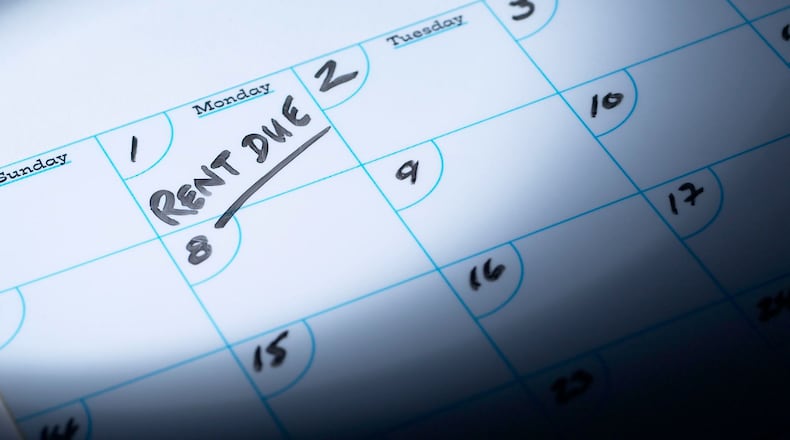Government programs and nonprofit groups have money available for rent, mortgage and utility assistance in metro Atlanta. Here are three routes to find help.
State resources
The state has allocated about one-tenth of the emergency rental assistance money it received from the federal government since March 2020, according to the Georgia Department of Community Affairs. As of March 22, nearly $900 million remains undistributed with $14.8 million scheduled.
To receive up to 18 months of rental payment relief, the DCA requires all of the following to be met:
-Eligibility for unemployment benefits or a demonstrated financial hardship since March 13, 2020. A COVID-19 hardship document is available on the DCA website.
-A demonstrated risk of homelessness or housing instability. This could include an eviction notice or a past-due rent or utility bill.
-A household income at or below 80% of an area’s median family income. The U.S. Department of Housing and Urban Development sets an area’s median family income based on family size. In Cobb, DeKalb, Fulton and Gwinnett counties, for example, 80% of the median family income for a family of four is $68,950. Applicants must show proof of income for all adults over 18 in the household. To verify income, the state accepts yearly income statements, such as a Form 1040 tax document, a wage statement or a receipt of certain benefits payments. These include Social Security and the Temporary Assistance for Needy Families program.
Applicants must provide proof of identity with a driver’s license or government photo ID. The state also requires proof of renter status with a lease agreement or verified month-to-month leasing arrangement. A full list of required documents and documentation options can be found on the community affairs department’s website (georgiarentalassistance.ga.gov/required-documents).
Local resources
Atlanta and surrounding counties have received federal emergency rental assistance funding, too. The City of Atlanta and Cobb and DeKalb counties are no longer accepting applications. Fulton and Gwinnett residents can still apply through their county government websites.
-Fulton County: fultoncountyga.gov/renthelp, 1-855-776-7912
-Gwinnett County: https://portal.neighborlysoftware.com/ERAP-GWINNETTCOUNTYGA/Participant
Cobb County requested further emergency rental assistance funds from the federal government and may receive additional money. DeKalb had not decided whether to reopen applications as of late February after receiving an additional $25 million geared toward pending applications. DCA spokesperson Adrion Bell said on March 10 the DCA does not have plans to reallocate funds to local governments.
Bell said applicants should apply for assistance either through their county or city government programs, if available, or through the DCA. Sending applications to both could result in delays. He said the average turnaround following “a completed and verified application” is around three to four weeks.
Nonprofits
Nonprofit groups with rental, mortgage and utility assistance programs remain good resources for emergency relief. But they vary in the level of assistance provided and the restrictions on who can receive funds.
It’s important to look at the website of a nonprofit before applying for funds to understand the restrictions in place. Restrictions can include income limits, rent price, location and documentation. Other groups providing rental relief without federal or state funding may have fewer limitations.
For example, the Lawrenceville Response Center run by Impact46 in Gwinnett County addresses some of the financial hardship due to the pandemic. The center provides rental and utility assistance only to people living within the Lawrenceville city limits.
Impact46 receives funding for its financial assistance from a HUD Emergency Solutions Grant. This carries tighter restrictions than the federal funding offered through state and local government programs.
Households must be at or below 50% of the area median family income to receive funds from Impact46, which is $43,100 in Lawrenceville, according to HUD. There is also a cap on the monthly rent price based on apartment size. Families are not eligible for Impact46 funding if they rent a two-bedroom apartment that costs more than $1,289 per month.
“The needs vary from we may have a family living in a car, (or) we get a phone call from a school, and then it can also range from someone being evicted that day,” said Jen Young, Impact46′s executive director. “That’s why we try to work as quickly as possible and contact people within 24 hours.”
United Way of Greater Atlanta specializes in connecting people with nonprofit service providers.
Its online 2-1-1 service (211online.unitedwayatlanta.org), allows users to enter their location and search for services in and around their area. A 2-1-1 search for the city of Clarkston, for example, gives results for 12 nonprofit and government agencies providing rental assistance within 13 miles of the city.
People can also dial 211 or text 211od to 898211 for a list of referrals based on ZIP code.
Donna Burnham, vice president of 2-1-1, said United Way staff vets the listed organizations in person to ensure they provide the resources they say they do. She said rental and utility assistance as well as eviction prevention are among United Way’s top five most sought-after needs.
Wait times for assistance depend on the organization referred to by United Way. A key barrier can be providing required documents as quickly as possible, Burnham said, which can also contribute to delays.
MEET OUR PARTNER
Working closely with the American Press Institute, The Atlanta Journal-Constitution is embarking on an experiment to identify, nurture and expand a network of news partnerships across metro Atlanta and the state.
Today’s story comes from our newest partner, the Covering Poverty project, which is part of the Journalism Writing Lab, an initiative of the Cox Institute for Journalism Innovation, Management and Leadership at the University of Georgia.
This story and others will become part of an online toolkit, coveringpoverty.uga.edu, which is devoted to helping journalists across the country cover meaningful stories about people and poverty-related matters.
If you have any feedback or questions about our partnerships, you can contact Senior Manager of Partnerships Nicole Williams via email at nicole.williams@ajc.com.
About the Author
Keep Reading
The Latest
Featured


